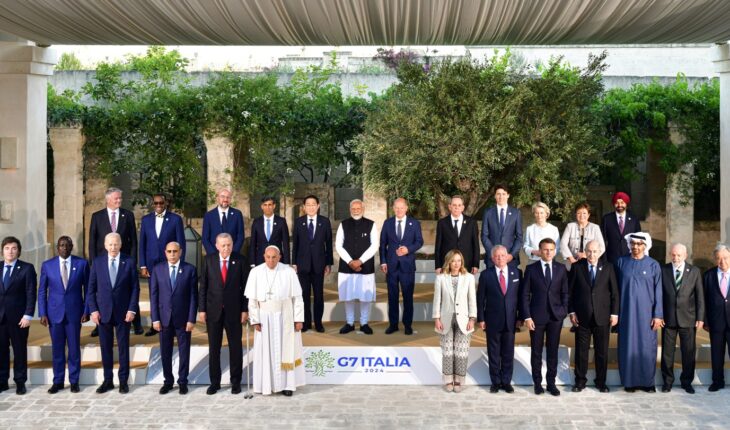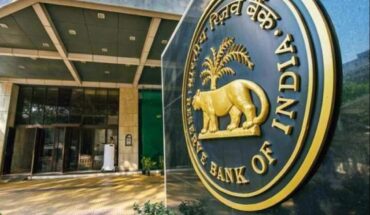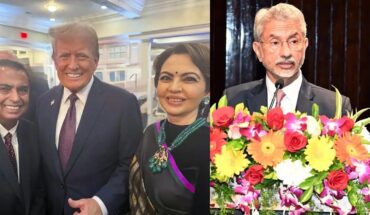Dr. Anil Kumar Angrish
Group of Seven (G7) Summit remained in news in 2nd week of June 2024 as it was India’s 11th participation in the G7 Summit, Prime Minister Narendra Modi’s fifth consecutive participation, and the first foreign trip for the G7 summit after being sworn in for a third term. The 50th G7 Summit had immense significance as the leaders of the seven member States (Italy, Canada, France, Germany, Japan, the United Kingdom, and the United States of America) came together along with participation from the European Union represented by the President of the European Council and the President of the European Commission. Leaders from 12 developing counties in Africa, South America and the Indo-Pacific region were also invited. It also assumed significance for India as Italian Prime Minister, Giorgia Meloni hosted the first major international forum after assuming office in October 2022. Italy pulled out of the Belt and Road Initiative (BRI), an initiative backed by China in December 2023 when the Prime Minister termed the joining BRI initiative as “a serious mistake”.
G7 countries are among top 10 largest economies as per their Gross Domestic Product (GDP) as the U.S.A. is ranked No. 1, Germany at No. 3, Japan at No. 4, United Kingdom at No. 6, France at No. 7, Italy at No. 9, and Canada at No. 10. And India is ranked at No. 5 and is not very far away from Japan. Given the rate of growth in India and Japan, India is expected to become 4th largest in another 12 months. India may emerge as the world’s 3rd largest economy in 2-3 years after overtaking Germany given the growth rate of both economies. Aggregate GDP of G7 Member States is about 43 per cent of the global economy in nominal terms. It is a coincidence that India’s drugs and pharmaceutical exports to G7 countries is about 42.11 per cent!
The G7 has taken up issues of global significance including those which had direct relevance to healthcare and pharmaceutical sector. In January 2002, it was the G8 bloc that played an important role in setting up of a Global Fund to fight malaria, TB and AIDS. The idea of the Global Fund was discussed at a G8 summit in Okinawa, Japan, in 2000. The bloc was known as G8 earlier as Russia was part of the Group from 1997 onwards until its expulsion in 2014. Since the creation of the Global Fund, more than US$60 bn have been disbursed to fight against HIV, TB and malaria and for programs to strengthen systems for health across more than 155 countries. On August 29, 2023, Lady Roslyn Morauta, Chair of the Board, the Global Fund wrote that annually, the Global Fund spends a minimum of US$ 600 million in India to procure essential health products, including HIV medicine, mosquito nets and diagnostic kits. She also acknowledged that several other global healthcare entities also turn to India for cost-effective pharmaceutical products, particularly for diseases like TB and HIV.
Member countries of G7 bloc are important for India’s pharmaceutical sector in terms of export markets as India exported pharmaceutical products worth US $11.72 bn to these markets out of total pharmaceutical exports of US$ 27.85 bn in FY24 (Table 1 for details).
Table 1:- Exports from India to G7 Countries in FY24
| Country | Total Exports from India ($ Mn) (April 2023-March 2024) | Percentage (%) Share in total exports |
| USA | 8,728.83 | 31.37 |
| UK | 784.32 | 2.82 |
| France | 667.49 | 2.40 |
| Germany | 567.42 | 2.04 |
| Canada | 502.42 | 1.81 |
| Japan | 241.62 | 0.87 |
| Italy | 233.56 | 0.80 |
| Total | 11,725.66 | 42.11% |
Source: Compiled from National Import Export Record for yearly Analysis of Trade (NIRYAT)
In 2022, Indian pharmaceutical companies supplied 47 per cent of all generic prescriptions in the USA (IQVIA report). Further, Indian pharmaceutical companies supplied more than 50 per cent of the prescriptions in five categories. Indian pharmaceutical companies’ share was 62 per cent in mental health, followed by 60 per cent in hypertension, 58 per cent in lipid regulators, 56 per cent in anti-ulcerants, and 55 per cent in nervous system disorders. India also has the highest number of U.S. Food and Drug Administration (USFDA)-compliant pharmaceutical plants outside of the USA.
In May 2024, the United Kingdom has overtaken China to become India’s fourth-largest export market. The UK was India’s sixth-largest export destination in May 2023. In past few months, exports to the UK were dominated by items which included pharmaceutical products.
G7 countries have strong pharmaceutical industry as evident from the fact that 34 out of top 50 global pharmaceutical MNCs (68 per cent) belong to G7 countries (Table 2). One Indian company – Sun Pharmaceutical Industries Limited also figures in the list of top 50. Majority of these MNCs have presence in India, e.g., Pfizer began its operations in India in 1950, and operates through three legal entities namely Pfizer Limited which is listed on the Bombay Stock Exchange; Pfizer Products India Private Limited which is a 100% Pfizer Inc. Subsidiary; and Pfizer Healthcare India Private Limited which is a 100% indirect subsidiary of Pfizer Inc and is focused on manufacturing and research. AbbVie Therapeutics India Private Limited is a joint venture between Allergan (now part of AbbVie) and Piramal Pharma Limited that commenced commercial operations in 1996. Bristol Myers Squibb (BMS) was in news in February 2024 when it announced the opening of a new Innovation Hub in Hyderabad. Innovation Hub, a US$ 100 mn site, has been opened to expand the company’s global drug development and information technology and digital capabilities.
Table 2:- Pharmaceutical Companies from India and G7 Countries among Top 50 Global Pharmaceutical MNCs
| Country | Pharmaceutical Companies (Global Rank) | Total Number out of Top 50 Global MNCs |
| USA | Pfizer (1), AbbVie (2), Johnson & Johnson (3), Merck & Co. (5), Bristol Myers Squibb (BMS) (7), Gilead Sciences (12), Amgen (15), Moderna (18) Viatris (19), Vertex (23), Biogen (25), Regeneron (28), Organon (30), Abbott Labs (36), Incyte (49) and Novavax (50) | 16 |
| UK | AstraZeneca (8) and GSK (10) | 2 |
| France | Sanofi (9), Les Laboratoires Servier (34), and Ipsen (46) | 3 |
| Germany | Boehringer Ingelheim (16), Bayer (17), Merck KGaA (24), Fresenius (40), and BioNTech (47) | 5 |
| Canada | Bausch Health (29) | 1 |
| Japan | Takeda (11), Astellas Pharma (22), Otsuka (26), Daiichi Sankyo (27), Chugai (35), and Eisai (38) | 6 |
| Italy | Menarini (45) | 1 |
| India | Sun Pharma (33) | 1 |
Source: Compilation based on the ranking by EvaluatePharma (2023, May) and Christel, Michael (2023, June 10). 2023 Pharm Exec Top 50 Companies.
Johnson & Johnson (J&J) which is world’s 3rd largest pharma company is in India since 1947. In 1947, it expanded into India, marketing Johnson’s Baby Powder. In September 1957, J&J incorporated a separate legal entity in India with 12 employees. Now, the company has more than 6,000 employees across three business segments – consumer products, medical devices and pharmaceuticals.
Takeda, a prominent Japanese pharma company has presence in India through a joint venture – Zydus Takeda Healthcare Private Limited, with Zydus Healthcare Limited. Menarini, Italian pharma major had started operations in India in 1994. At that time, it had a joint venture with Raunaq Industries, and the joined venture was named Menarini Raunaq Pharma Limited (MRPL). A. Menarini India Pvt. Limited operates in India at present and was in news in September 2023 when Lupin announced acquisition of five legacy brands from Menarini.
Many top MNCs from G7 countries are now listed on Indian stock exchanges, e.g., AstraZeneca India was established in 1979 and is a listed company on Indian stock exchanges. GlaxoSmithKline Pharmaceuticals Limited is also a listed company in India. Sanofi India Limited is present in India since 1956 as it was born under the name of Hoechst Fedco Pharma Private Limited, and is now listed on the BSE and the NSE. Boehinger Ingelheim India was set up in 2003 and it currently ranks 8th among MNCs. It has entered into strategic alliances for diabetes management in India by partnering with Indian companies – Lupin Limited and Torrent Pharma Limited. Hence, MNCs from G7 countries have significant presence in India. Many MNCs from these countries are listed in India, and have collaborations/strategic alliances/joint ventures with Indian pharmaceutical companies. These collaborations provide opportunity to Indian pharmaceutical companies in areas such as R&D, co-marketing, manufacturing, and licensing to name a few. This was visible when Oxford University, AstraZeneca, and Serum Institute of India (SII) came together for providing vaccine during recent pandemic.
Connection through pharmaceuticals is evident in Foreign Direct Investment (FDI) inflows too. In 2023-24, overall FDI equity inflows in India amounted to US$ 44.42 bn. Among top 10 countries in terms of FDI inflows in India, the US is the 3rd largest investor with $4.99 bn foreign investments, Japan ranks 5th ($3.17 bn), UK ranks 7th ($1.2 bn), and Germany ranks 9th with $505 mn.
Table 3: Country-wise FDI Equity Inflow in India (Apr 2000 to Mar 2024)
| G7 Country | Rank | Amount of FDI Equity Inflow (US $ Mn) |
| U.S.A. | 3 | 65,193.91 |
| Japan | 5 | 41,917.74 |
| United Kingdom | 6 | 35,091.44 |
| Germany | 9 | 14,642.94 |
| France | 11 | 10,943.96 |
| Canada | 17 | 3,858.34 |
| Italy | 18 | 3,444.35 |
Source: Compiled from FDI Statistics. Department for Promotion of Industy and Internal Trade (DPIIT). Ministry of Commerce and Industry. GoI
Drugs and Pharmaceuticals sector is ranked 8th in terms of FDI with a Cumulative FDI Equity Inflow of US$ 22,528 Mn from April 2000 to March 2024 which forms 3.32 per cent of total FDI Equity inflows in terms of US $.
Through Vaccine Maitri initiative, India has shown the determination to make a difference at a difficult moment for global society while reinforcing reputation of the country as the ‘Pharmacy of the World’. Through pharmaceuticals, G7 nations and India Connection through pharmaceuticals can further strengthen multilateral cooperation between G7 countries and India.
Dr. Anil Kumar Angrish-Associate Professor (Finance and Accounting),Department of Pharmaceutical Management, NIPER, SAS Nagar (Mohali), Punjab
Disclaimer: Views are personal and do not represent the views of the Institute.






